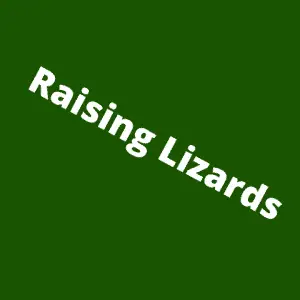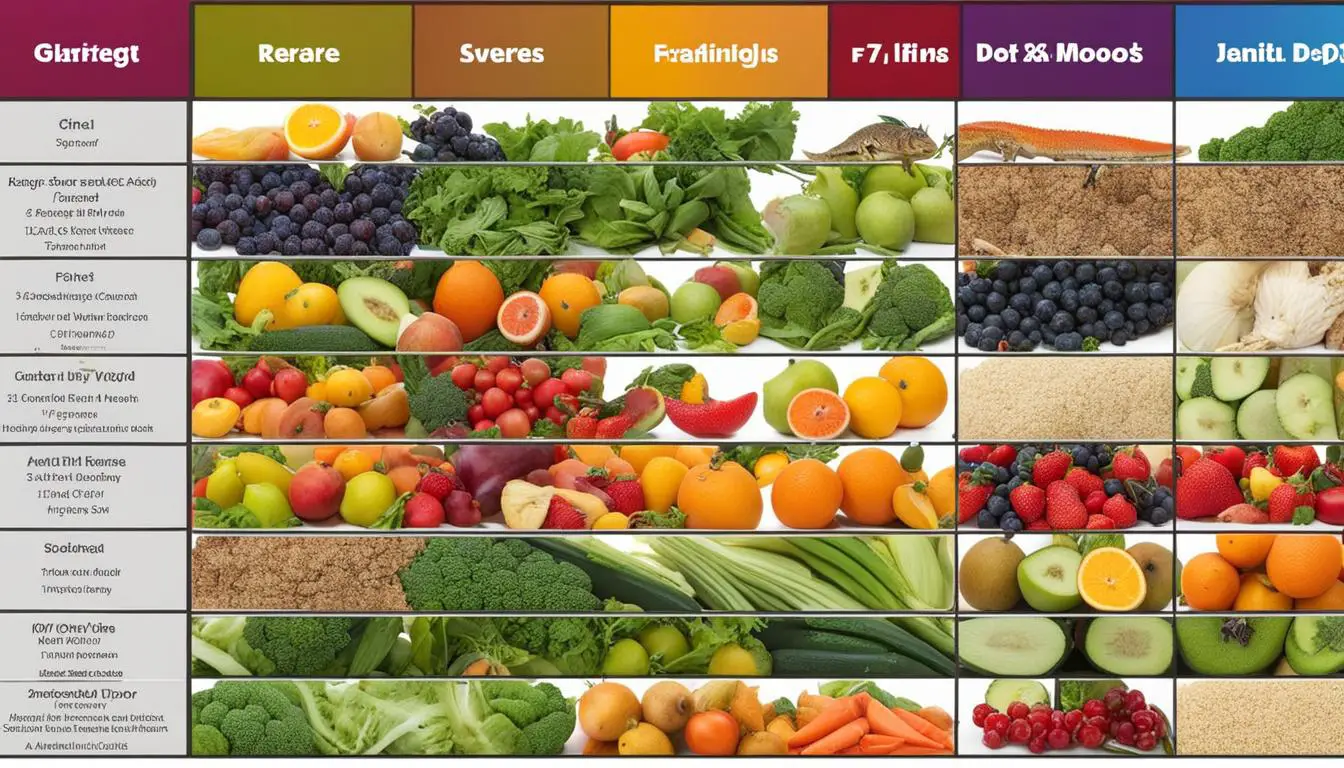For those with a one-year-old bearded dragon, it is important to understand the proper diet to ensure their health and growth. Bearded dragons are omnivorous reptiles, requiring a mix of plant and animal-based foods. Superworms are safe for older juvenile dragons, while younger ones should primarily eat insects. Fresh vegetables and fruits should also be included in their diet. The length of a bearded dragon’s juvenile life is typically 6-12 months.
Key Takeaways:
- Bearded dragons are omnivorous reptiles that require a balanced diet of both plant and animal-based foods.
- For one-year-old bearded dragons, insects should make up a significant portion of their diet, with fresh vegetables and fruits also included.
- It is important to adjust the feeding schedule and portion sizes as the dragon grows older and their nutritional needs change.
- Monitoring the dragon’s weight and consulting a veterinarian if necessary is crucial for their health and growth.
- Providing a varied and balanced diet will ensure the bearded dragon’s overall health and well-being.
Feeding Recommendations for 1 Year Old Bearded Dragons
When it comes to the diet of a one-year-old bearded dragon, it is crucial to provide them with the right balance of nutrients for their growth and overall well-being. A one-year-old bearded dragon should consume a combination of insects and vegetation, with approximately 70% of their nutrition coming from insects. It is important to vary their diet and offer a mix of protein and plant matter to ensure they receive all the necessary nutrients.
A typical feeding schedule for a one-year-old bearded dragon is three times a day, with each feeding consisting of 20 to 40 crickets. The feeding period should last around 10 to 15 minutes, allowing the dragon to consume as many insects as possible in that time frame. After the feeding session, it is essential to remove any remaining insects to prevent overfeeding.
To provide a balanced diet, it is important to include a variety of insects such as crickets, mealworms, and kingworms in their meals. Alongside the insects, fresh vegetables and fruits should be offered to ensure they receive the necessary vitamins and minerals. It is recommended to adjust the feeding schedule and portion sizes as the dragon grows older to meet their changing nutritional needs.
| Age | Feeding Frequency | Number of Crickets per Feeding |
|---|---|---|
| One year old | Three times per day | 20 to 40 |
Remember, a balanced and varied diet is essential for the health and longevity of your one-year-old bearded dragon. By providing a mix of insects, vegetables, and fruits, you can ensure they receive all the necessary nutrients for their growth and development.
What Should Bearded Dragons Eat Daily?
Proper nutrition is vital for the health and well-being of bearded dragons. These reptiles require a balanced diet consisting of vegetables, fruits, and insects on a daily basis. Adult bearded dragons should consume approximately 75% of their body weight in vegetables, while juvenile dragons need a daily salad for optimal nutrition.
The timing of feeding is also crucial. Bearded dragons should be fed two hours after their lights turn on and at least two hours before their lights turn off. This helps mimic their natural feeding patterns and ensures they have enough time to properly digest their food.
“Providing a varied and balanced diet is essential to meet the nutritional needs of bearded dragons and promote their overall health and happiness.”
When it comes to insects, bearded dragons can enjoy a variety of options such as crickets, mealworms, and kingworms. It’s important to avoid feeding them insects caught in the wild, as these may carry parasites or pesticides. Instead, opt for commercially raised insects that are safe for consumption.
| Recommended Daily Diet for Bearded Dragons | Quantity |
|---|---|
| Fresh Vegetables (e.g., collard greens, kale, bell peppers) | Approximately 75% of their body weight |
| Fresh Fruits (e.g., strawberries, blueberries, mango) | 5-10% of their body weight |
| Insects (e.g., crickets, mealworms, kingworms) | As many as they can eat in a 10 to 15 minute period |
Providing a varied and balanced diet will ensure that bearded dragons receive the necessary nutrients for their growth and overall well-being. Remember to always consult with a veterinarian for personalized advice on your bearded dragon’s dietary needs.
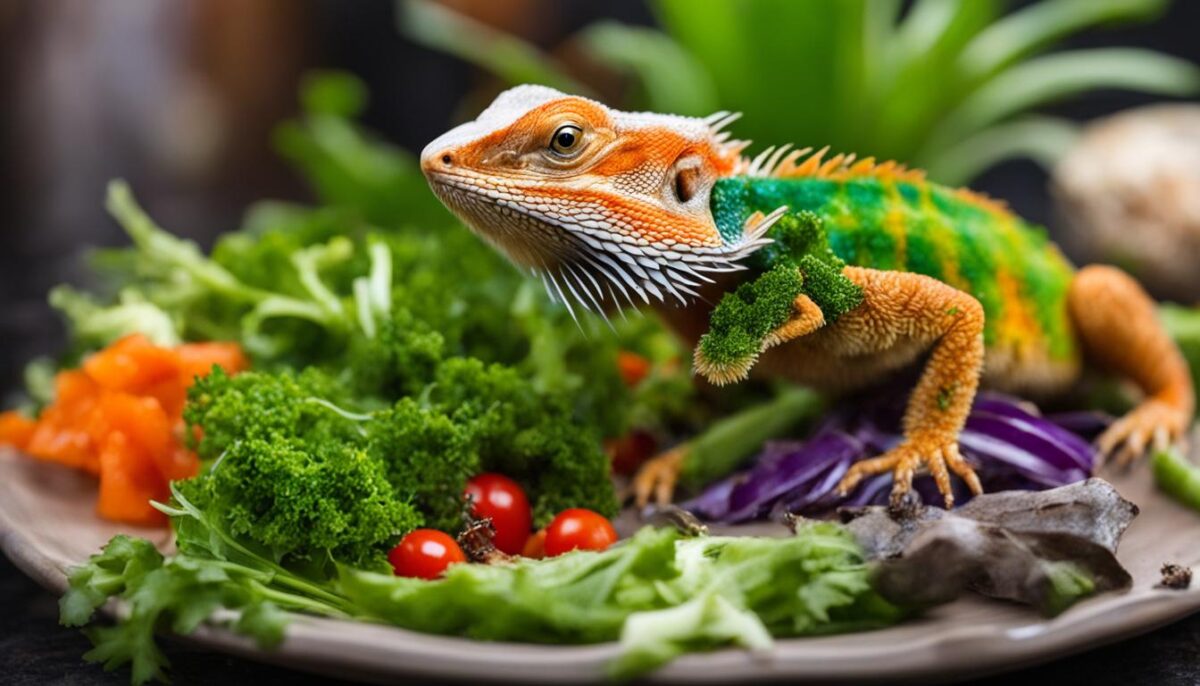
How Much Should a 1 Year Old Bearded Dragon Weigh?
Monitoring the weight of a 1 year old bearded dragon is important to ensure their proper growth and overall health. On average, a healthy 1 year old bearded dragon should weigh between 250 and 350 grams. However, it’s important to note that weight can vary based on factors such as size and breed.
Regularly weighing your bearded dragon and tracking their weight can help you determine if they are growing at a healthy rate. If you notice a significant weight loss or gain, it may be a sign of an underlying health issue, and it is recommended to consult with a veterinarian.
To weigh your bearded dragon, you can use a small digital scale or a kitchen scale. Place a clean cloth or a small container on the scale and gently place your dragon on top. Make sure to handle them with care and avoid causing any stress or discomfort during the weighing process.
| Age | Weight Range |
|---|---|
| 1 year old | 250 – 350 grams |
Remember that while weight is an important factor, it should be considered alongside other signs of health and well-being, such as activity levels, appetite, and overall appearance. By providing a balanced diet, proper husbandry, and regular veterinary check-ups, you can help your 1 year old bearded dragon thrive and live a long, healthy life.
How Often Should a 1 Year Old Bearded Dragon Eat?
A 1 year old bearded dragon should be fed three times per day, with as many insects as possible given in a 10 to 15 minute feeding period. It is important to remove any remaining insects after feeding to avoid overfeeding. The dragon can consume between 20 and 50 insects per day. The frequency and amount of feeding should be adjusted as the dragon grows older.
Feeding Schedule for a 1 Year Old Bearded Dragon:
- First Feeding: In the morning, around 1-2 hours after their lights turn on, offer a variety of insects such as crickets, superworms, or dubia roaches.
- Second Feeding: In the afternoon, around midday, provide more insects or a combination of insects and vegetables.
- Third Feeding: In the evening, at least two hours before their lights turn off, offer a small portion of insects or vegetables.
It is important to monitor your bearded dragon’s appetite and adjust the feeding schedule accordingly. If the dragon consistently leaves food uneaten or shows signs of being overweight, you may need to decrease the feeding frequency or adjust the portion sizes. Ensure that fresh water is available at all times and remove any uneaten food after each feeding session.
Remember, a balanced diet is crucial for the health and well-being of your 1 year old bearded dragon. In addition to insects, incorporate a variety of vegetables and occasional fruits to provide essential nutrients. Consult with a reptile veterinarian for specific dietary recommendations based on your dragon’s size, health, and specific needs.
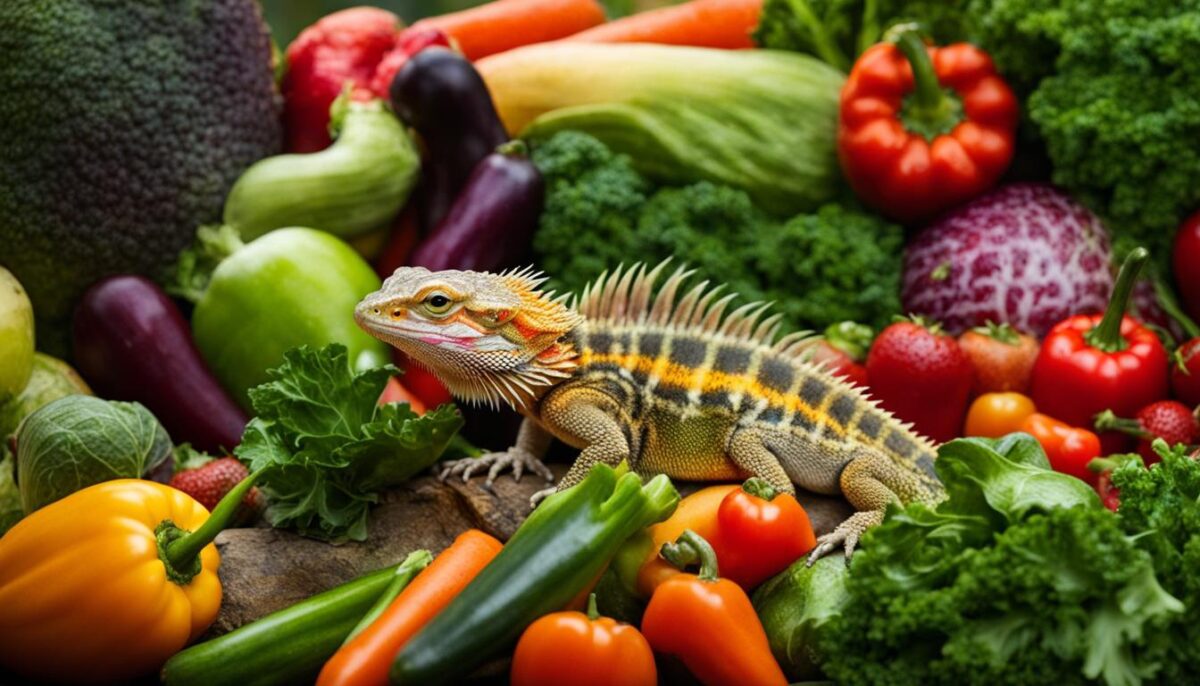
What Can Bearded Dragons Eat?
Bearded dragons have a diverse palate and can eat a variety of foods to meet their nutritional needs. Here are some options for feeding your bearded dragon:
- Insects: Crickets, mealworms, kingworms, and superworms are all suitable insect options for your bearded dragon. These insects provide essential protein for their diet.
- Vegetables: Dark leafy greens like kale, collard greens, and dandelion greens are excellent choices for your bearded dragon’s vegetable intake. You can also include veggies like squash, bell peppers, and carrots for added variety.
- Fruits: While fruits should be fed sparingly due to their sugar content, you can offer small amounts of fruits such as apples, berries, and melons. Avoid feeding citrus fruits to your bearded dragon.
It is important to provide a balanced mix of protein and plant matter in your bearded dragon’s diet. Aim to feed them a variety of foods to ensure they receive all the necessary nutrients. Be cautious not to overfeed your bearded dragon, as obesity can lead to health issues. Consult a reptile veterinarian for specific dietary recommendations based on your dragon’s age and overall health.
Table: Recommended Foods for Bearded Dragons
| Insects | Vegetables | Fruits |
|---|---|---|
| Crickets | Kale | Apples |
| Mealworms | Collard greens | Berries |
| Kingworms | Dandelion greens | Melons |
| Superworms | Squash | – |
Remember to provide fresh, clean water for your bearded dragon at all times. Keep in mind that their dietary needs may change as they grow and age, so it’s essential to stay informed and adjust their diet accordingly. By offering a balanced and varied diet, you can ensure the health and well-being of your bearded dragon.
Baby Bearded Dragon Diet and Care
Feeding and caring for a baby bearded dragon requires special attention to their unique needs. A proper diet is crucial for their growth and development. Baby bearded dragons are highly active and require a high-protein diet to support their rapid growth. The diet should consist of approximately 70% insect foods, such as crickets and mealworms, which provide essential nutrients and promote healthy muscle development.
In addition to insects, it’s important to provide a variety of vegetables to ensure a balanced diet. Leafy greens like kale, collard greens, and mustard greens are excellent choices, as they are packed with vitamins and minerals. These should be finely chopped or shredded to make it easier for the baby dragon to consume. It’s also beneficial to include some fruits, such as berries or melons, as occasional treats.
When feeding a baby bearded dragon, it’s important to offer smaller, bite-sized portions multiple times a day to accommodate their smaller stomachs. As they grow older, their feeding schedule can be adjusted to fewer feedings per day. It’s crucial to monitor their weight regularly to ensure they are growing at a healthy rate. If you notice any abnormal weight loss or gain, it’s best to consult a reptile veterinarian for guidance.
Proper care for a baby bearded dragon
In addition to diet, providing proper care is essential for the health and well-being of your baby bearded dragon. Here are some key considerations:
- Temperature: Baby bearded dragons require a basking area with a temperature of around 100°F (37°C) and a cooler area around 80°F (27°C) to regulate their body temperature.
- UVB lighting: UVB lighting is crucial for the synthesis of vitamin D3, which helps the dragon absorb calcium. Make sure to provide a UVB bulb specifically designed for reptiles.
- Enclosure: A properly sized enclosure with appropriate substrate, hiding spots, and climbing branches will provide a comfortable and stimulating environment for your baby dragon.
- Hydration: Baby bearded dragons should have access to fresh, clean water at all times. Spray their enclosure with water to maintain humidity levels and facilitate shedding.
- Handling: Handle your baby dragon gently and regularly to promote socialization and reduce stress. Be mindful of their delicate bodies and avoid excessive handling.
By providing a nutritious diet and proper care, you can ensure your baby bearded dragon thrives and grows into a healthy adult. Remember to monitor their development closely and consult a reptile veterinarian for any concerns or questions you may have. With the right care and attention, your baby dragon will become a beloved companion for years to come.
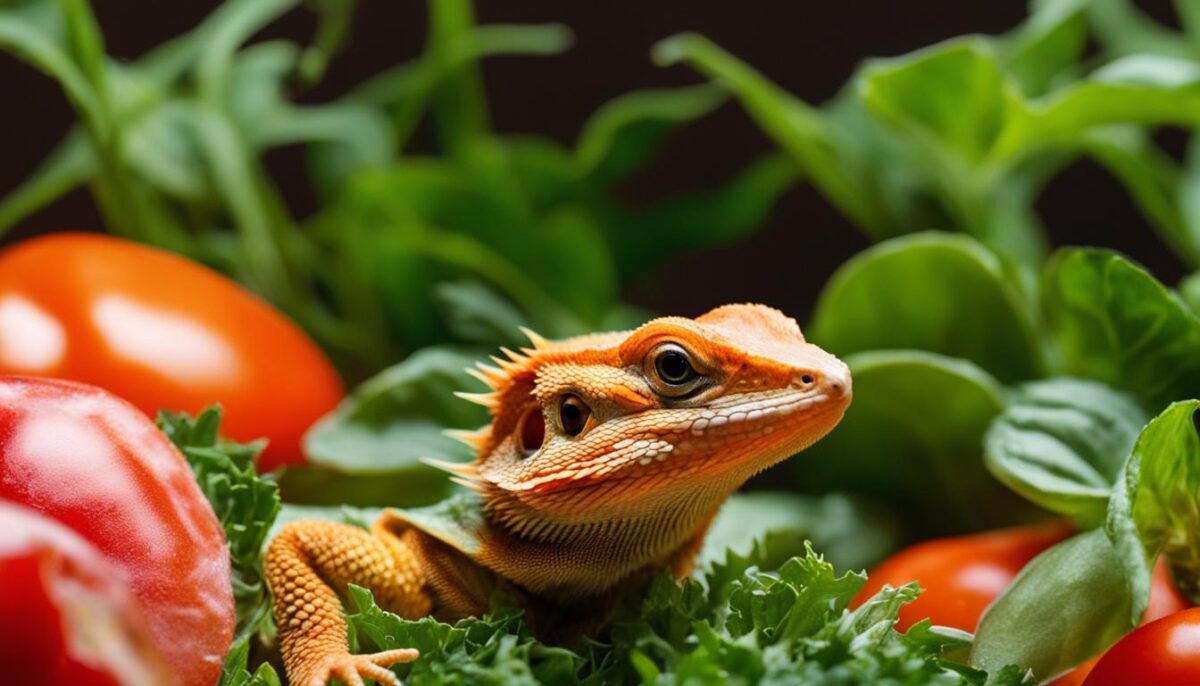
Conclusion
In conclusion, the diet of a bearded dragon plays a crucial role in their overall health and well-being. It is important to provide a balanced mix of protein, vegetables, and fruits to meet their nutritional needs. By following the recommended feeding schedules and portion sizes based on their age, bearded dragons can thrive and maintain optimal health.
Monitoring the weight of a bearded dragon is also essential to ensure proper growth. Regularly checking their weight and consulting a veterinarian if any significant changes are noticed can help prevent health issues. Additionally, incorporating calcium and vitamin supplements into their diet can contribute to their overall well-being.
Remember that a varied and balanced diet is key to the longevity and happiness of a bearded dragon. By offering a diverse selection of food and maintaining their feeding routine, you can provide the necessary nutrients for their growth and development, allowing them to live long, healthy lives.
FAQ
What is the ideal diet for a 1-year-old bearded dragon?
A 1-year-old bearded dragon should have a mix of plant and animal-based foods. They should primarily eat insects, with fresh vegetables and fruits also included in their diet.
How many times a day should I feed my 1-year-old bearded dragon?
A 1-year-old bearded dragon should be fed three times per day.
What should be the ratio of insects to plant matter in a 1-year-old bearded dragon’s diet?
Around 70% of a 1-year-old bearded dragon’s nutrition should come from insects, while the remaining 30% should come from plant matter.
How much should a 1-year-old bearded dragon weigh?
A 1-year-old bearded dragon should weigh between 250 and 350 grams.
How many insects should a 1-year-old bearded dragon eat per day?
A 1-year-old bearded dragon can consume between 20 and 50 insects per day.
What should adult bearded dragons eat?
Adult bearded dragons should have a balanced diet of insects, fruits, and vegetables. Approximately 80% of their diet should come from plant matter.
What foods can bearded dragons eat?
Bearded dragons can eat a variety of foods, including crickets, mealworms, kingworms, vegetables, fruits, and limited amounts of fruit. However, citrus fruits should be avoided.
What should I feed a baby bearded dragon?
Baby bearded dragons require a diet high in protein, with approximately 70% of their nutrition coming from insects. Their diet should gradually transition to a more balanced one as they grow older.
What is the importance of a proper diet for bearded dragons?
A proper diet is crucial for the overall health and well-being of bearded dragons. It ensures their growth, development, and long-term health.
